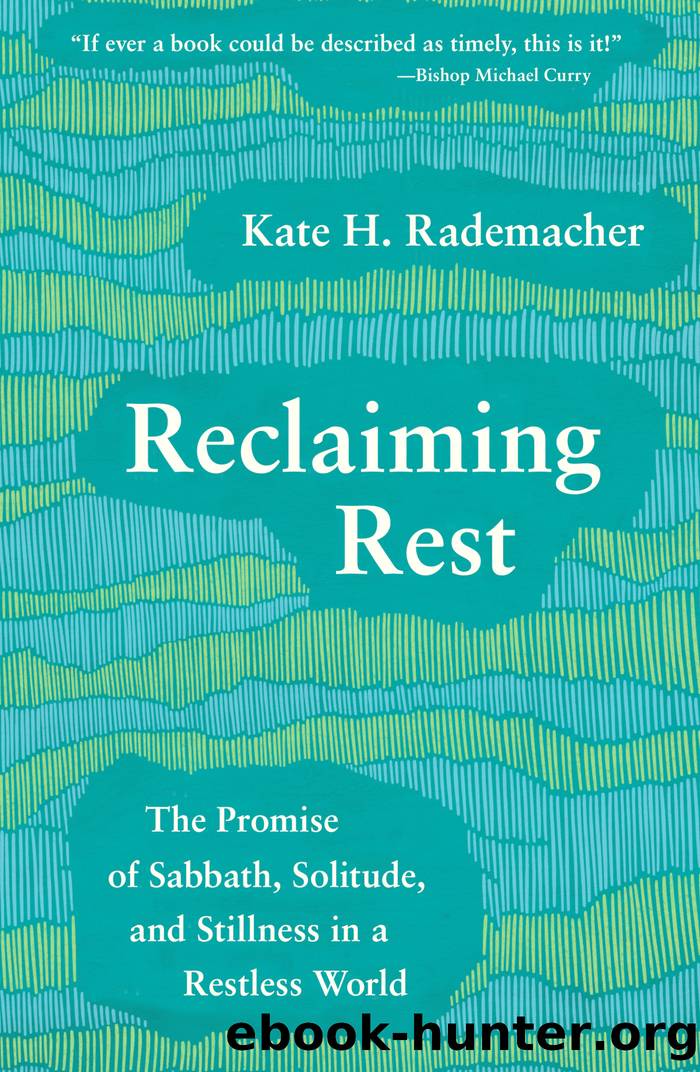Reclaiming Rest by Kate H. Rademacher

Author:Kate H. Rademacher [Rademacher, Kate H.]
Language: eng
Format: epub
Tags: REL012120 Religion / Christian Life / Spiritual Growth, REL012070 Religion / Christian Life / Personal Growth, REL012000 Religion / Christian Life / General
Publisher: Broadleaf Books
11
Challenging the Fallacy of Work-Life Balance
Reclaiming a 24/6 Schedule
SEVERAL MONTHS INTO THE PANDEMIC, I participated in a webinar intended to explore how the global community could sustain critical health-care services for adolescent girls and women during COVID-19. During one of the presentations, a donor from an international aid agency spoke, and she advised that participants embrace a principle that is commonly applied in humanitarian crisis situations. She said that we needed to use the time during and after the pandemic as an opportunity to âbuild back better.â
I had never heard that phrase before, and I loved it. Build back better. After the call, I thought about all the areas where this concept applied. In the United States and around the world, many of us clearly saw a need to build back better when it came to large-scale social institutionsâhealth care, the economy, criminal justice systems, education, the ways we steward natural resources. There was also a need to build back better in our personal lives. As part of this, I wondered, How could we build back better when it came to rest?
Perhaps the crisis could be an opportunity to reclaim a differentâand ancientâunderstanding of how to achieve balance in our lives. As a first step, I wondered if it was time to reject a prevailing ideal: the ubiquitous search for work-life balance.
â â â
According to Forbes magazine, the phrase âwork-life balanceâ is googled an average of fifty thousand times per month.1 Yet some have become increasingly critical of the concept, arguing that the framework is both limiting and misleading. The phrase implies that, as an antidote to our own tendencies toward workaholism and the unreasonable demands of our employers, we must fight back by reserving adequate time and energy for the âpersonalâ components of our lives: our households, families, health, friendships, hobbies, chores. But writer Maria Popova argues this juxtaposition is inherently problematic. She writes, âI have always found2 the notion of compromisingâparticularly when it comes to this unfair tradeoff of work and lifeâto be a double-edged sword of meaning: on the one hand, a compromise implies reaching a happy medium between two conflicting needs; on the other, to compromise requires the trimming off of excess in one area in order to alleviate a deficit in the other, which invariably means compromisingâin the sense of underminingâthe area deemed excessive.â
Similarly, in his book The Three Marriages, poet and author David Whyte argues that whenever we neglect any of the critical parts of our livesâincluding our relationships with others, our work, or our individual sense of selfâwe âimpoverish them all, because they are not actually separate commitments but different expressions of the way each individual belongs to the world.â The result, he argues, is that âthe current understanding of work-life balance is too simplistic. People find it hard to balance work with family, family with self, because it might not be a question of balance. Some other dynamic is in play, something to do with a very human attempt at happiness that does not quantify different parts of life and then set them against one another.
Download
This site does not store any files on its server. We only index and link to content provided by other sites. Please contact the content providers to delete copyright contents if any and email us, we'll remove relevant links or contents immediately.
The 5 Love Languages: The Secret to Love That Lasts by Gary Chapman(9768)
The Space Between by Michelle L. Teichman(6921)
Assassin’s Fate by Robin Hobb(6192)
Wiseguy by Nicholas Pileggi(5762)
Everything Happens for a Reason by Kate Bowler(4729)
Gerald's Game by Stephen King(4631)
Pillow Thoughts by Courtney Peppernell(4268)
A Simplified Life by Emily Ley(4155)
The Power of Positive Thinking by Norman Vincent Peale(4053)
Harry Potter and the Prisoner of Azkaban (Book 3) by J. K. Rowling(3346)
Resisting Happiness by Matthew Kelly(3332)
Girl, Wash Your Face by Rachel Hollis(3273)
Being Aware of Being Aware by Rupert Spira(3266)
The Code Book by Simon Singh(3167)
The Secret Power of Speaking God's Word by Joyce Meyer(3154)
More Language of Letting Go: 366 New Daily Meditations by Melody Beattie(3017)
Real Sex by Lauren F. Winner(3002)
Name Book, The: Over 10,000 Names--Their Meanings, Origins, and Spiritual Significance by Astoria Dorothy(2967)
The Holy Spirit by Billy Graham(2938)
